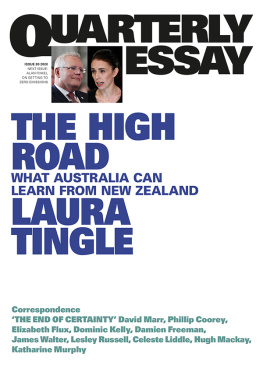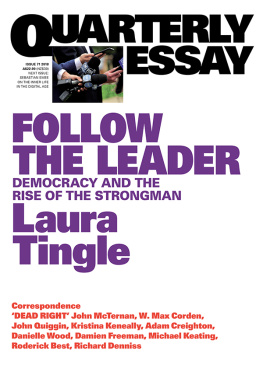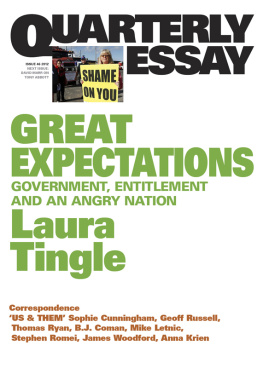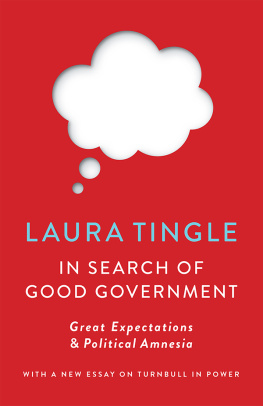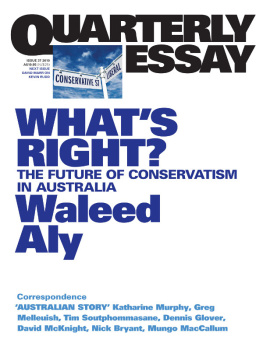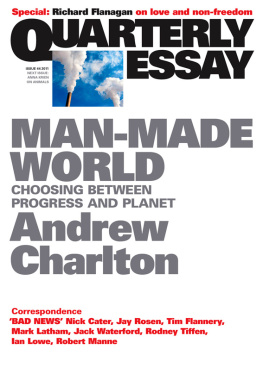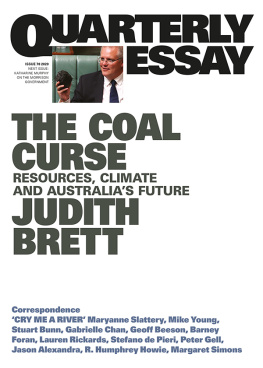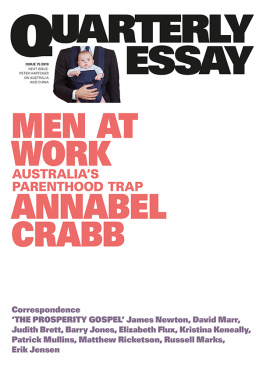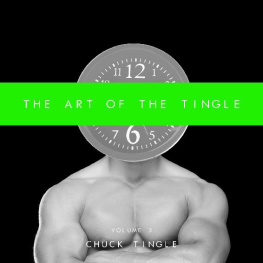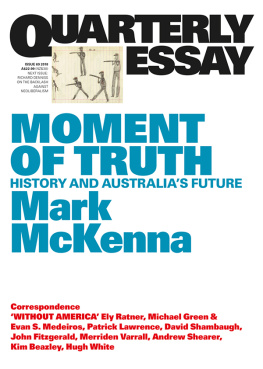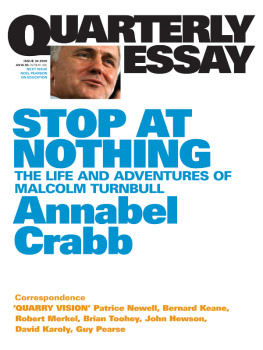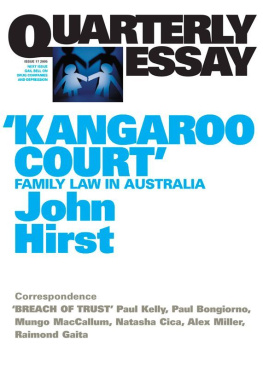Quarterly Essay is published four times a year by Black Inc., an imprint of Schwartz Books Pty Ltd. Publisher: Morry Schwartz.
ISBN 9781743821626 ISSN 1832-0953
All Rights Reserved.
No part of this publication may be reproduced, stored in a retrieval system, or transmitted in any form by any means electronic, mechanical, photocopying, recording or otherwise without the prior consent of the publishers.
Essay & correspondence retained by the authors.
Subscriptions 1 year print & digital (4 issues): $79.95 within Australia incl. GST. Outside Australia $119.95. 2 years print & digital (8 issues): $149.95 within Australia incl. GST. 1 year digital only: $49.95.
Payment may be made by Mastercard or Visa, or by cheque made out to Schwartz Books. Payment includes postage and handling.
To subscribe, fill out and post the subscription card or form inside this issue, or subscribe online:
quarterlyessay.com
Phone: 61 3 9486 0288
Correspondence should be addressed to:
The Editor, Quarterly Essay
Level 1, 221 Drummond Street
Carlton VIC 3053 Australia
Phone: 61 3 9486 0288 / Fax: 61 3 9011 6106
Email:
Editor: Chris Feik. Management: Elisabeth Young. Publicity: Anna Lensky. Design: Guy Mirabella. Assistant Editor: Kirstie Innes-Will. Production Coordinator: Marilyn de Castro. Typesetting: Tristan Main.
THE HIGH ROAD | What Australia can learn from New Zealand |
Laura Tingle |
In late March 2020, a young woman announced she was closing down her country.
If community transmission takes off in New Zealand, the number of cases will double every five days, New Zealands prime minister, Jacinda Ardern, told a press conference on 23 March. If that happens unchecked, our health system will be inundated and tens of thousands of New Zealanders will die. There is no easy way to say that, but it is the reality we have seen overseas and the possibility we must face here.
Ardern had already announced a huge economic support package, including wage subsidies, on 17 March, equivalent to 4 per cent of her countrys GDP. This was five days after Australias first economic response to COVID-19, but on a scale that dwarfed the Australian response, which was around 1.2 per cent of GDP.
On 19 March, both Australia and New Zealand announced they would close their borders: New Zealand at midnight that night, Australia the day after. What triggered Arderns move to go even further on 23 March was just two cases of COVID-19 in New Zealand due to community transmission, on top of 100 cases among travellers. Not only did Ardern close New Zealands borders, she shut down the domestic economy too, in some of the strictest lockdowns attempted anywhere, as shell-shocked governments around the globe tried to formulate responses to a virus that had erupted in the space of a couple of months to kill thousands and devastate the international economy. What was more, Ardern wasnt just planning to keep the virus at bay, she was planning to eliminate it. These decisions will place the most significant restrictions on New Zealanders movements in modern history, Ardern said. This is not a decision taken lightly. The worst-case scenario is simply intolerable. It would represent the greatest loss of New Zealanders lives in our history, and I will not take that chance.
She gave New Zealanders two days to get ready. At the press conference where she made these grim announcements, she was asked if she was scared. I am not afraid, because we have a plan. Weve listened to the science. We are moving early, and I just ask New Zealanders now to come with us on what will be an extraordinary period of time for everyone.
From Australia, we watched in shock, scepticism or admiration. Our political leaders were wrestling with the same issues, but prevaricating by Arderns standards. Yes, we had moved early to close our borders to China, our largest trading partner but closing the borders completely? And shutting down the economy?
Our path was more gradual and the messages more mixed, to say the least. On 13 March, ten days before Ardern announced New Zealands lockdown, thousands of race fans were gathering in Melbourne for the Australian Formula One Grand Prix. The state government had so far resisted calls to cancel, and fans queued up at the gate to attend practice sessions ahead of the race on 15 March, but at the last minute the government stopped the event amid increasing alarm from public health experts about the potentially disastrous mix of local and international spectators at close quarters.
Ten days before that, on 5 March, the Morrison government had extended travel bans from China and Iran to South Korea, but argued against a ban on travellers from Italy, despite the alarming spread of the disease there.
The lead-up to the Grand Prix became a shambles, with prominent driver Lewis Hamilton highly critical of the decision to let the race proceed, and the McLaren team withdrawing after team members tested positive for coronavirus.
The economic fallout from the virus in Australia was already becoming apparent: the federal government had announced its first multi-billion-dollar plan to offset the effects. But on the day the Grand Prix was finally cancelled, things only became more confused. Prime Minister Scott Morrison announced that all non-essential gatherings of 500 or more people would be restricted or banned from the following Monday. But, he said, he was still planning to go the football that weekend: I am going on Saturday because it might be the last chance for a while.
Morrison repeatedly warned that those arguing for a rapid and radical response like the one New Zealand would soon unveil might not like what they wished for when they got it, because opening an economy up again, once you had closed it, was difficult and complex.
In Australia we were trying to have the best of both worlds: to limit the impact of the virus, but also to limit its economic impact by minimising the shutdown.
New Zealands response to the coronavirus is just the latest reason Australians have sometimes looked wistfully, or at least with interest, across the Tasman. Much of the recent looking has been driven by a fascination with Ardern, particularly admiration for her empathetic leadership in the wake of the Christchurch massacre, the White Island volcano eruption and the pandemic. Her stunning win in the October 2020 election gives our politicians a particular reason to look at how politics has been done in New Zealand in recent times.
But Ardern is not the first reason we have had to look across the Tasman and wonder whether there is another way of doing things. And her uncompromising positions do feel like part of a pattern. Little New Zealand perhaps the only place in the world that has suffered isolation and the tyranny of distance more than Australia has repeatedly jumped out of its comfort zone and changed direction harder, faster and for longer than Australia has done in the past half-century. Long before Australians noticed Ardern, its leaders were deregulating the economy more radically, cutting tax rates further, standing their ground for a more independent foreign policy against the United States and against the French over their nuclear testing in the Pacific.
When you listen to Kiwi accounts of how these things happened, there is a sort of no-nonsense pragmatism in the telling, particularly compared to the contortions of Australian politics. Consider Helen Clark on the 2003 decision not to join the Coalition of the Willing in Iraq:
Look, you read the raw intelligence, you read the [NZ external intelligence agency] assessment. Recall the U.S. didnt give us everything. But it just wasnt convincing. So that was the first point, there wasnt the evidence. And secondly, the UN community wasnt convinced. It went to the Security Council, it couldnt get through. So, New Zealand is not in the habit of bucking decisions of the Security Council. That has not been our position. So, on the facts, just a no-brainer not to go near it.

